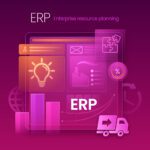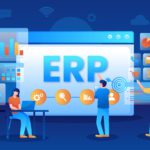In today’s rapidly evolving business landscape, organizations are increasingly recognizing the importance of sustainable supplier practices. These practices not only help businesses align with environmental and social governance (ESG) goals but also contribute to fostering a more inclusive and efficient supply chain. As sustainability continues to gain traction, businesses are turning to emerging technologies, such as artificial intelligence (AI) and blockchain, to accelerate their efforts in building a more sustainable and diverse supplier network.
In this article, we explore how AI and blockchain, two of the most transformative technologies, can revolutionize sustainable supplier initiatives. By enhancing transparency, efficiency, and inclusivity, these technologies have the potential to redefine how companies identify, engage with, and support sustainable suppliers.
1. AI-Powered Supplier Discovery
Artificial intelligence offers tremendous potential for improving the way organizations identify and engage with sustainable suppliers. Traditional supplier discovery processes often rely on manual research or limited databases, which can lead to inefficiencies and missed opportunities. With AI, companies can automate the supplier discovery process, making it faster and more data-driven.
AI-powered tools can analyze vast datasets from multiple sources, such as supplier databases, social media platforms, and business directories, to identify potential sustainable suppliers. These algorithms can filter suppliers based on factors like minority ownership, certification status, or past performance. This automated approach not only accelerates the discovery process but also expands the pool of potential suppliers, ensuring that businesses have access to a broader range of options for fulfilling their procurement needs.
By leveraging AI for supplier discovery, organizations can make more informed decisions and enhance supplier diversity efforts, all while saving time and resources.
2. Bias Detection and Mitigation
One of the critical challenges in supplier diversity efforts is mitigating unconscious bias during supplier selection. Historical procurement processes may have favored certain suppliers based on subjective criteria, leading to the exclusion of minority-owned or underrepresented suppliers. AI can play a crucial role in addressing these biases by analyzing historical procurement data and identifying patterns of favoritism or discrimination.
AI-powered tools can flag potential biases in supplier evaluation criteria, such as preferential treatment for specific supplier groups, which may affect supplier diversity and inclusion efforts. By using AI to identify and mitigate biases in real-time, companies can ensure a more equitable and objective supplier selection process. This approach not only improves diversity but also reduces the risk of legal or reputational consequences that could arise from biased practices.
Incorporating AI to eliminate biases enhances supplier equity, enabling companies to create a more diverse and sustainable supply chain.
3. Blockchain for Supply Chain Transparency
Blockchain technology offers unparalleled transparency and traceability in supply chain management. One of the key benefits of blockchain is its ability to securely store and verify transaction records across a decentralized, tamper-proof ledger. For sustainable suppliers, this technology has the potential to verify the authenticity and integrity of suppliers’ credentials and ensure compliance with sustainability standards.
By recording supplier data, certifications, and transactions on a blockchain-based system, businesses can build greater trust with customers, investors, and regulators. Blockchain ensures that supplier information cannot be altered, providing full visibility into the supply chain. This transparency is especially critical for organizations seeking to verify that their suppliers are meeting environmental, social, and governance (ESG) requirements.
With blockchain, businesses can enhance their sustainable supplier practices by ensuring that suppliers’ sustainability claims are verifiable and legitimate, helping reduce the risk of fraud or misrepresentation in supply chains.
4. Smart Contracts for Fair and Transparent Procurement
Smart contracts, powered by blockchain technology, automate and enforce procurement processes in a fair and transparent manner. These self-executing contracts ensure that all parties involved in the transaction adhere to predefined terms, such as payment schedules, delivery timelines, and quality standards.
For sustainable suppliers, smart contracts provide a way to guarantee that procurement activities are equitable and compliant with sustainability goals. These contracts automatically execute actions based on predefined conditions, reducing the potential for human error or bias. Additionally, smart contracts improve the efficiency of procurement workflows by eliminating administrative overhead and accelerating contract execution.
By leveraging blockchain-based smart contracts, companies can ensure fair treatment of sustainable suppliers, streamline procurement activities, and create a more transparent and accountable procurement process.
5. Predictive Analytics for Strategic Planning
AI-powered predictive analytics is another powerful tool that organizations can use to enhance their sustainable supplier initiatives. Predictive analytics leverages historical data, market trends, and demographic shifts to forecast future trends and optimize procurement strategies.
For sustainable suppliers, predictive analytics can help businesses anticipate demand for specific sustainable products or services, identify emerging markets, and make data-driven decisions to align procurement strategies with sustainability goals. By utilizing predictive models, companies can optimize resource allocation, improve supplier relationships, and ensure that their supply chains are prepared for future disruptions or trends.
Predictive analytics can also identify potential gaps in supplier diversity and sustainability, enabling businesses to proactively address these issues and strengthen their supply chain resilience.
6. Collaboration and Ecosystem Building
AI and blockchain technologies not only streamline procurement processes but also facilitate collaboration and ecosystem building among various stakeholders in the supply chain. AI-powered matchmaking platforms can connect buyers with sustainable suppliers based on complementary needs and capabilities, while blockchain-based networks can enable secure and transparent collaboration across multiple parties.
Through these technologies, organizations can create ecosystems that foster innovation, knowledge sharing, and collective action to advance sustainability goals across industries and regions. AI and blockchain allow for seamless collaboration between suppliers, buyers, certifying agencies, and advocacy groups, helping businesses achieve their sustainability targets more effectively and efficiently.
By embracing these collaborative technologies, organizations can build stronger partnerships with sustainable suppliers, encourage shared goals, and create a more sustainable supply chain ecosystem.
Conclusion
Emerging technologies, such as AI and blockchain, have the potential to revolutionize sustainable supplier practices, driving greater transparency, efficiency, and inclusivity in procurement. By harnessing the transformative power of AI and blockchain, businesses can enhance supplier discovery, eliminate biases, ensure compliance, and foster collaboration across their supply chains.
As companies increasingly recognize the strategic importance of sustainable supplier practices, they must embrace these cutting-edge technologies to unlock new opportunities for growth, innovation, and social impact. The future of procurement lies in leveraging emerging technologies to create a more inclusive, efficient, and transparent supply chain that benefits both businesses and the communities they serve.
By adopting AI and blockchain, organizations can enhance their sustainability efforts, drive positive change in their supply chains, and contribute to building a more equitable and sustainable future for all.






